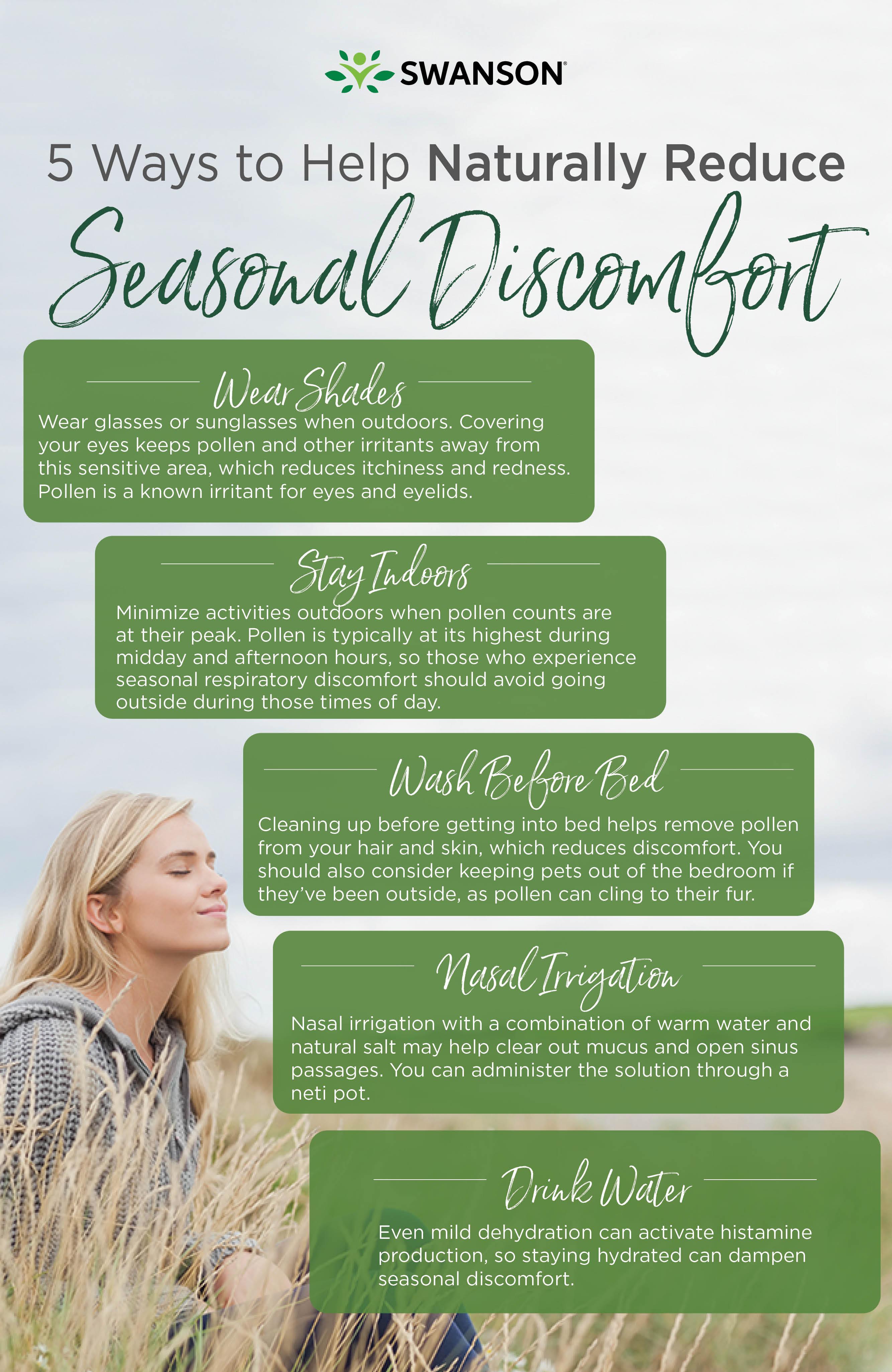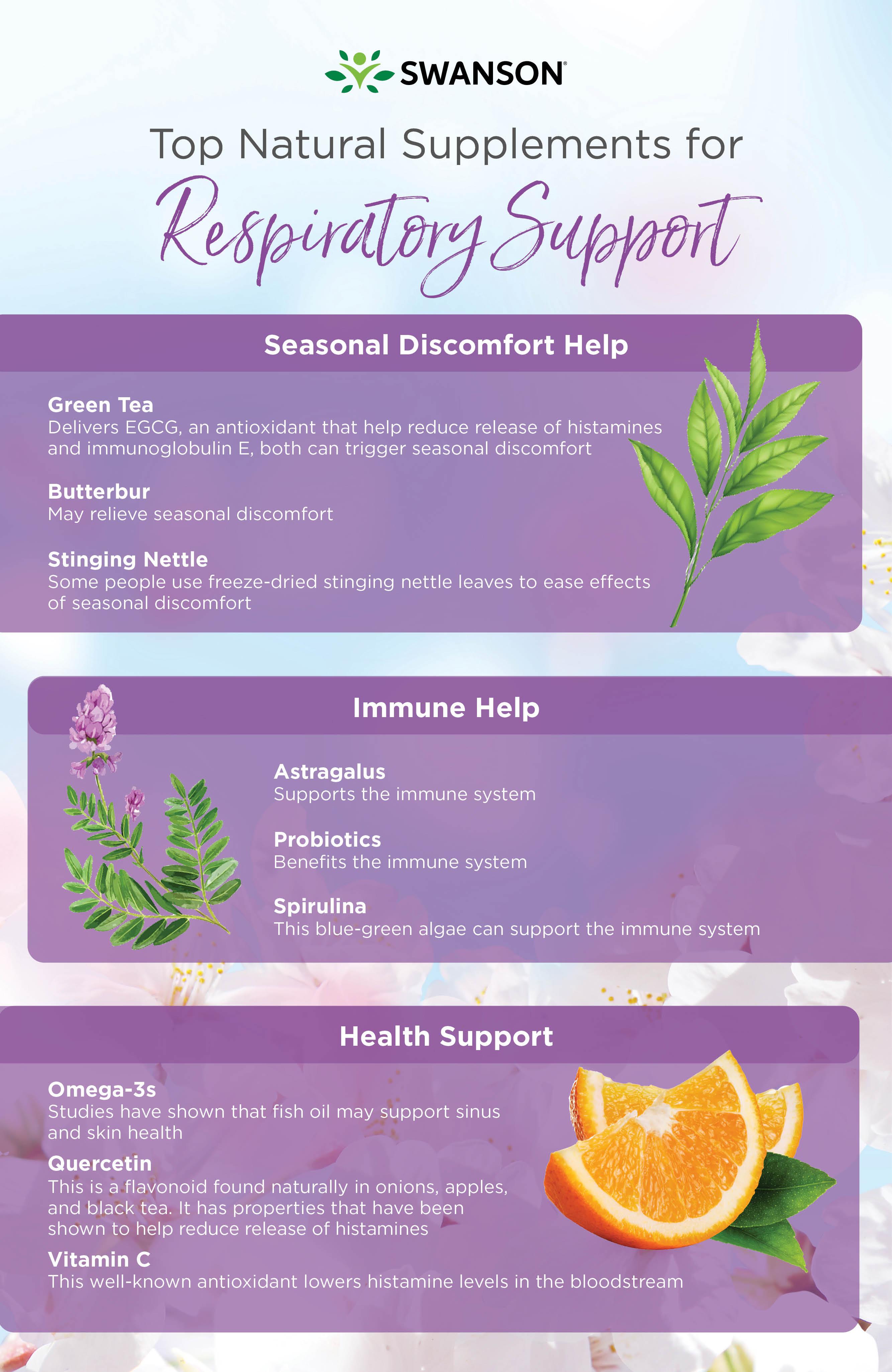Natural Respiratory Support Essentials
Springtime offers us sunshine, budding flowers and blooming trees. But for many of us, these are the very elements that make venturing outside into the glorious post-winter world an unpleasant event.
Seasonal respiratory challenges exacerbated by tree pollen—and in more humid areas, mold—can make springtime a lousy time of year. For people with certain sensitivities, these challenges can result in sneezing, coughing, congestion, itchy eyes and a runny nose.1
So why does this happen? In some folks, the body’s immune system overreacts to foreign substances such as pollen or mold, releasing chemicals like histamine into the body.2 This can result in unpleasant respiratory symptoms.
Removing Respiratory Irritants Indoors
Staying inside when pollen or mold spore levels are high is one way to reduce the misery of seasonal respiratory irritants. But elements that may cause respiratory discomfort can also be present indoors as well.
How can you clean your home of these and other irritants before they cause respiratory discomfort? The first step is to identify those elements which may be hiding in your home and causing the discomfort in the first place. Among the worst offenders in this category is dust.
What is Dust?
Even the most meticulously cleaned abode may harbor dust. But what is dust? The answer depends on a number of factors, but generally speaking, dust is most often comprised of the following elements:
- Soil and plant material
- Human hair and skin cells
- Animal hair/dander
- Fabric fibers
- Mold spores
- Dust mites
- Insect parts and waste
Top Tips to Remove Indoor Respiratory Irritants
We can't stop the formation of dust or pollen, but there are things which we can do to remove them from our homes and reduce our exposure. Here are some top tips for removing indoor respiratory irritants:
- Run the air conditioner on warmer days. While it may seem pleasant to leave your windows or doors open on warmer days, this can often let in more than just balmy breezes. Dust, pollen and other seasonal respiratory irritants can waft into your home as well, exacerbating your efforts to avoid these elements in the firt place.
- When using forced air furnaces and air conditioning systems, be sure to install high-efficiency filters and regularly maintain the system as instructed by the manufacturer. Keep your air conditioning and furnace filters fresh by changing them every three months3 and by using filters with a MERV rating of 8 to 12. A MERV rating tells you how well the filter can remove pollen and mold from the air as it passes through.4
- Vacuum furnace/air conditioning vents and air returns
- Use a dehumidifier to keep indoor air dry
- Use HEPA filters in portable units (especially in the bedroom) and in vacuum cleaners
- Sweep, dust and vacuum often. Don’t forget to get the spaces behind, under and on top of your refrigerator, as well as moving beds or other furniture that may be hiding dust underneath.
- Wash your sheets. Dust mite particles can be found in your bedding, which may trigger allergies. Washing your sheets once a week,5 and comforters or quilts every few weeks, will help rid your bed of these particles.
- Listen for drips. Leaks around the house can result in a mold problem, which may in turn lead to respiratory irritants and discomfort. Once a leak is sealed, clean around the area with disinfectant or a hot water and bleach mixture.
- Move your plants. Like any area of the house, plants can grow mold over time. If you smell the musty odor of mold on your houseplant, throw it away or move it to an area of the house that isn’t frequently used.
How to Naturally Reduce Seasonal Discomfort:

- Wear shades. Wearing glasses or sunglasses when outdoors can help keep pollen and other seasonal irritants away from your eyes.
- Minimize outdoor activities when pollen counts are at their peak. Pollen is typically at its highest point during midday and afternoon hours, so it may be beneficial for those with certain respiratory sensitivities to avoid going outside during such times.
- Wash up before bed. Cleaning up before getting into bed helps remove pollen from your hair and skin, which can thus reduce irritation. You should also consider keeping pets out of the bedroom if they’ve been outside, as pollen and other irritants can cling to their fur.
- Nasal irrigation, as unusual as it may sound, can help clear out mucus and open sinus passages. Easily administer a solution of warm water and natural salt by using a neti pot.
- Drink water. Even mild dehydration can activate your body's production of histamine, a chemical which may cause respiratory discomfort.
How Can I Avoid Seasonal Discomfort?
1. Don’t manage symptoms without knowing what you're reacting to. Instead, visit an alergist to help pinpoint the cause. That will help determine the best course of treatment.
2. Don't blindly spend on over-the-counter medications. There are tons of allergy medications available at the store, some of which can be very effective. But if you’re buying new products all the time, spending a bundle and not feeling better, consult with an allergist who can discuss which options might be best for you.
3. Don’t wait until symptoms kick in. Instead, prepare by using preventative methods which have worked for you in the past. Pay attention to the forecast: When winter weather turns warm, pollens and molds are released into the air. Try to stay ahead of the game to help ensure you're feeling 100% in any season!
4. Never hang clothing or laundry outside. Hanging laundry is a great way to be "green" and save on your electricity bill, but as your clothes hang on the clothesline, fabrics may collect pollen or dust, both of which can affect your respiratory function. Consider using a clothes dryer instead.
5. Avoid eating foods that may cause discomfort. If certain foods cause you discomfort repeatedly, it may be best to avoid them altogether until you're able to speak with a professional.
9 Supplements for Respiratory Support
More than 50 million Americans experience seasonal respiratory challenges each year.6 If experience sneezing, coughing or watery eyes at times, you're not alone!
While no magic cure-all exists for seasonal challenges like those discussed earlier, there are quite a few natural supplements that you can take to help ease respiratory discomfort.
 Here's a list of some of the most popular natural allies for seasonal support:
Here's a list of some of the most popular natural allies for seasonal support:
1. GreenTea
This traditional favorite offers a host of health benefits, including featuring a powerful compound known as methylated epigallocatechin gallate (EGCG for short). In lab studies, EGCG has been shown to offer not only strong antioxidant support, but to also have positive effects on respiratory health in response to seasonal irritants.9
2. Butterbur
Butterbur is a shrub which has historically been used to support a number of respiratory and other bodily functions and to soothe seasonal discomfort. Its name is derived from the traditional use of its leaves to wrap butter in warmer weather.8
The extracts of the roots and leaves of this plant have been used for a wide variety of health benefits, including reducing respiratory discomfort related to seasonal irritants.14
4. Astragalus
A traditional favorite of Chinese herbalists, this ancient root has been used to promote immune health and overall wellness and vitality.7
5. Probiotics
Probiotics have been studied for their positive effect on immune health, particularly as relates to the immune system's role in responding to seasonal irritants and respiratory discomfort.10
6. Spirulina
Studies have shown that this blue-green algae may help reduce the release of histamine in response to seasonal irritants.13 Additionally, spirulina is recognized for its soothing antioxidant properties including providing defense against free radicals.
7. Omega-3s
The DHA and EPA essential fatty acids known as omega-3s have been associated in scientific studies with having many healthful benefits, including soothing respiratory discomfort related to seasonal irritants.11
8. Quercetin
This flavonoid has been shown to help reduce the release of histamine, a chemical produced by the body in response to seasonal irritants and know to play a role in respiratory discomfort.12
9. Vitamin C
Not just for immune support, vitamin C is a powerful antioxidant which has been shown to dramatically reduce the body's production of histamine, a chemical released in response to seasonal irritants.15
The Bottom Line
As we've seen, seasonal irritants and respiratory discomfort are common experiences that many of us share, but this doesn't mean that there's nothing that can be done to improve our situation.
Simple steps can be taken to ensure our homes are free of irritants and there are a number of healthy tips we can keep in mind to mitigate respiratory discomforts.
We've also got quite a line up of natural allies that we can draw on to help us get better enjoy the great outdoors in any season!
*These statements have not been evaluated by the Food and Drug Administration. These products are not intended to diagnose, treat, cure, or prevent any disease.
Sources
1. National Health Service. Read source
2. Histamine. WebMD. Read source
3. How Often Do You REALLY Need To Change Your HVAC Filter? U.S. Home Filter. Read source
4. What is a MERV Rating? Environmental Protection Agency. Read source
5. How Often Should You Wash Your Sheets? Sleep Foundation. Read source
6. Facts and Figures. AAFA. Read source
7. Astragalus. Mount Sinai. Read source
8. Butterbur. National Center for Complimentary and Integrative Health. Read source
9. Green Tea. ScienceDaily. Read source
10. The Role of Probiotics. AACI Journal. Read source
11. Role of Omega-3 Fatty Acids. PubMed. Read source
12. Quercetin. Mount Sinai. Read source
13. Spirulina Health Benefits. Ro Health Guide. Read source
14. Stinging Nettle. WebMD. Read source
15. Vitamin C. HealthLine. Read source




